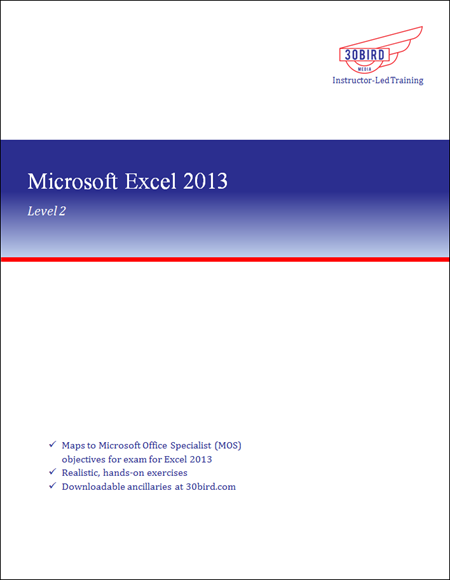Chapter 1: Managing workbooks
Module A: Managing worksheets
Module B: Customizing Excel
Chapter 2: Named ranges
Module A: Using names in formulas
Chapter 3: Tables
Module A: Sorting
Module B: Filtering tables
Module C: Validation
Module D: Transposing data
Chapter 4: Summarizing data
Module A: Consolidation
Module B: Subtotals
Chapter 5: PivotTables
Module A: Creating and formatting PivotTables
Module B: Manipulating PivotTables
Module C: PivotCharts
Chapter 6: Presentation features
Module A: Conditional formats
Module B: Graphics
Chapter 7: Advanced charts
Module A: Special chart types
Module B: Sparklines
Chapter 8: Collaboration
Module A: Permissions
Module B: Shared workbooks
Module C: Web features
Excel 2013 Level 2 builds on the basic concepts and skills of our Level 1 course to provide more advanced tools for analysis and presentation of complex, realistic data in Microsoft Excel 2013: how to manage complex workbooks, build more complex functions, use data analysis tools, make an impact with powerful chart and presentation features, and collaborate with other users. The three levels of our Excel 2013 courses map to the objectives of the Microsoft Office Specialist and Expert exams for Excel 2013. Objective coverage is marked throughout the course, and you can download an objective map for the series from http://www.30bird.com.
Students will benefit most from this course if they want to use Excel 2013 to perform real-world tasks such as rearranging and presenting complex data. If they intend to take a Microsoft Office Specialist or Expert exam for Excel, this course will continue their preparation, but they will need to continue on to the Level 3 course, particularly to prepare for the Expert exam.
The course assumes students know how to use a computer, that they're familiar with Microsoft Windows, and that they've taken the Level 1 course or have equivalent introductory experience with Excel.
To request the PowerPoints for this course, please e-mail sales@30bird.com.

